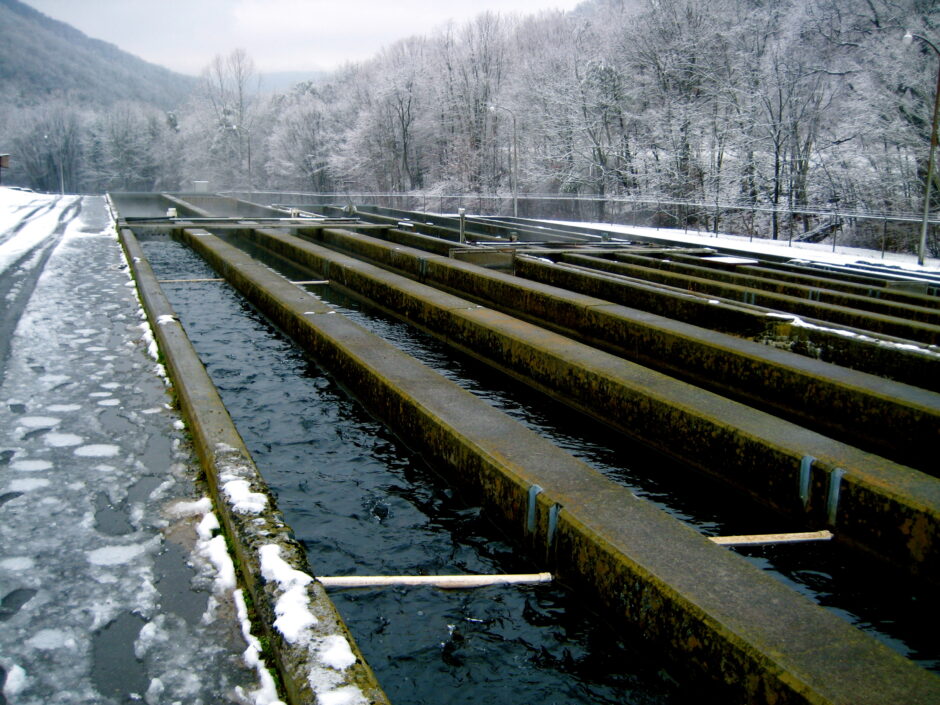Michigan’s Aquaculture Operation in the Great Lakes
 Paint Bank State Raceway Fish Hatchery (Credit: Taber Andrew Bain via Flickr CC BY 2.0) )
Paint Bank State Raceway Fish Hatchery (Credit: Taber Andrew Bain via Flickr CC BY 2.0) )For decades, hatchery programs on the Great Lakes have provided juvenile fish for stocking and supported a $7 billion fishery industry. This stock is enjoyed by both recreational anglers and commercial operations, which provide fish to the rest of the region. However, recent environmental stressors like invasive aquatic species and algae blooms have led some to question how sustainable the fishery is. According to NPR, concerns led to the proposal of aquaculture programs in the Great Lakes.
Aquaculture in the Great Lakes
States in the Great Lakes region have reason to be concerned about the health of the native fishery leading each to investigate opportunities to help mitigate any future deterioration. Michigan is one of the state’s looking into various ways to develop aquaculture in four of the five lakes that surround it. Volunteer experts from three state departments are working together on a scientific panel to study the effects of commercial fish farming in the state’s waters.
The panel will examine the impact of net-pen aquaculture in particular, a fish farming method that uses floating offshore enclosures to house larger hatchery-raised fish. The only commercial net pens in the Great Lakes are on the Canadian side of Lake Huron. Opponents of the practice say that’s where they should stay. Supporters believe that aquaculture is a necessary next step for fish farming.
In 2015, only one company in Michigan raised fish for restaurants and grocery stores in large volumes. Dan Vogler, the owner of Harrietta Hills Trout Farm, told NPR, “The reality is that the native Great Lakes wild fishery is in a state of general collapse [. . .] If we’re going to have locally available fish, it has to come from fish farms.”
Why People Oppose Aquaculture
While the type of aquaculture facilities proposed—closed, recirculating and flow-through hatchery facilities—have some risks, there is much greater opposition to net-pen aquaculture. In these facilities, farmed fish share the water with everything beyond their enclosures, which can lead them to be exposed to parasites and disease. Other opponents say that aquaculture would conflict with recreational angling, as both tend to target deeper waters just offshore.
Additionally, without a flushing tide, waste may accumulate within the pen and contribute to excess nutrient loads, potentially leading to increased algae blooms—meaning that the pens would fail to help protect fish from the same concerns that prompted the increase in fish farming.
According to proponents of net-pen aquaculture—including operators of Canada’s rainbow trout fish farms—excess nutrient loads are not a major issue and may actually benefit wild fish populations struggling to survive in the upper Great Lakes’ more sterile waters.
Conclusion
The Michigan Department of Natural Resources plans to take these concerns into consideration as the state develops its aquaculture program. In 2020, Michigan State University compiled data on fish farming in Michigan. As of 2022, more than 60% of Michigan’s 52 aquaculture operations use farms, while 22% use flow-through systems or raceways. The industry supplied 111 jobs and produced 23 different types of fish for various purposes that serve the region.
Going forward, states surrounding the Great Lakes will continue to consider how aquaculture may help improve fishing conditions in the region. If commercial and recreational anglers are to continue being able to meet demands, it is essential that the Great Lakes have a sustainable fishery.



0 comments